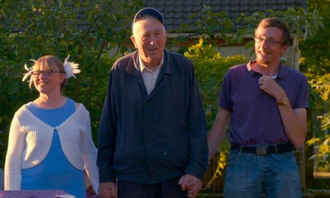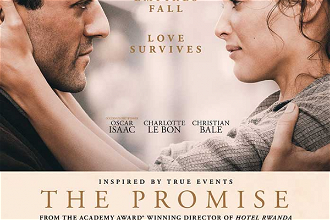Film: Summer in the Forest - its about all of us

Jean Vanier with Celine and Fred
If you had just one word to describe Randall Wright's new documentary Summer in the Forest, it would have to be Joy.
This beautiful film explores two of Jean Vanier's L'Arche communities, listening to residents' stories and accompanying them as they live and work together.
While many documentary makers drop in on communities for a short time, film people and leave - Wright's team really took a leaf out of Vanier's philosophy - spending months with L'Arche residents, getting to know them, so that they were able to become participants in the film rather than just subjects - able to relax and speak freely about their lives, ignoring the cameras.
The film was also given its own fine musical score, composed by John Harle.
The result is a real work of art.
There are 149 L'Arche communities around the world where people with and without learning disabilities live and work together.
Vanier, a Canadian naval officer turned philosopher, started the first community after he visited a prison-like institution for people with learning difficulties, in France in 1964. He was so shocked at the conditions there, he invited two of the residents, Patrick and Michel to share his home.
Vanier says in the film: "We began with no plan. It was crazy. The idea of rejecting all authority and living together. I knew nothing about this world of people with disability - but as you laughed together barriers dropped."
Now in their 70s, Patrick and Michel still live at Trosly-Breuil. They have never forgotten their terrible experiences, but they are safe now and know they are loved. In the film we meet many of the other residents. There's David, a strong young man who quite naturally doesn't like being treated as a child. He enjoys martial arts and careering around on his bike and earns his own living. We meet Celine and Fred, who have their engagement party in the garden of the house - and Andre, who would love to have a girlfriend.
Vanier says: "When I have to go and see people in Paris, I'm not terribly happy … It's like a ping pong match. I have to prove that I know more than you."
The film goes on to visit one of the newest L'Arche homes, in Bethlehem, in the Palestinian Occupied Territories, where Muslims and Christians live and work together. Its a happy environment. Sara, who suffered brain damage as a baby when she fell out of a car, is always smiling. "If someone is unhappy," she says simply, "I always try to help them".
Speaking against the backdrop of the Separation Wall in Bethlehem, Vanier says: "What is it to be a human being. Is it the power? If its power then we are going to kill each other. The wise and powerful lead us to ideologies. Whereas the weak are in the dirt. they are not seeking power they are seeking friendship. Its a message for all of us. Its about all of us."
In 2015, Jean Vanier was awarded the Templeton Prize for his work. At the presentation ceremony at St Martin in the Fields in LOndon - (which was attended by many church leaders as well a group of L'Arche residents) he said: "people with learning difficulties are often the most overlooked, the most ignored, the most humiliated people in our society. In the past, disabilities have been seen as a punishment from God and and often these people were hidden away in institutions."
"People who are not endowed with intellectual gifts have unique and marvelous gifts of the heart, and can open us to love in a special way," he said. "They are not crying out for advancement or knowledge or power, but simply for a personal relationship of love that will give them life and meaning."
Vanier pointed out: "Jesus said, 'When you give a special meal, don't invite your family and rich neighbours, so that they invite you back in return. No, when you give a meal, invite rather the poor, the crippled, the lame, the blind: that they cannot repay your invitation means you will be blessed.'"
Society is so divided, he said. "Let us meet across differences - intellectual, cultural, national, racial, religious and other differences. Then from this initial meeting we can begin to build community together. "Community is a place of belonging where each person can grow to become fully him or herself. It is belonging for becoming. We belong to each other so that each member can become more human, more loving, more open to others, particularly to those who are different, and finally more free."
Summer in the Forest is on release around the UK through the Picturehouse group. To find a screening near you, or to download the film online (for the UK and parts of Europe) visit: www.summerintheforest.com
Watch the official trailer here: www.youtube.com/watch?v=eUAFzYGCrS4
Damaris Media have issued a free booklet about the film for use in parish or school discussion groups. See: http://filmblog.damarismedia.com/summer-in-the-forest-lose-yourself-to-find-your-heart/
















